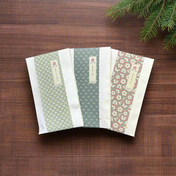Most of the historical or major matcha manufacturers in Japan are too big for us to carry. We attempt to support companies of 50 employees or smaller. In the future, we may sell from some of these companies if we buy through another smaller tea shop thereby supporting a family-operated business according to our purchasing principles.
Video taken at historical matcha manufacturer Marukyu Koyamaen
I have heard that the electric grinders cost between $15,000 – $30,000. Recently some have coolant systems to reduce the heat caused by the friction. This heat will degrade the flavor and aroma of the matcha powder. In general, the factory will produce about 500 grams of matcha per grinder per day.
Cheaper, mass-produced matcha will either use more common tea leaf cultivars like Yabukita, large leaves harvested in the summer or autumn, and will be produced using ball mill grinding, in which the leaves are rotated in a mill with ceramic balls that crush the leaves. While this produces more matcha more quickly, the friction generated degrades the powder and the grains themselves are more squarish rather than rounded. The shape affects the flavor apparently…more research needed on our part.
Video from major matcha manufacturer Aiya that explains the overall process of making matcha. Remember, matcha is made from tencha leaves, leaves that have been shaded for about 4 weeks, then steamed and dried without rolling turning into flakes rather than the needle-like shape you see in sencha or gyokuro tea leaves.
The post VIDEO: How matcha is ground at factories (commercial production) appeared first on YUNOMI.

